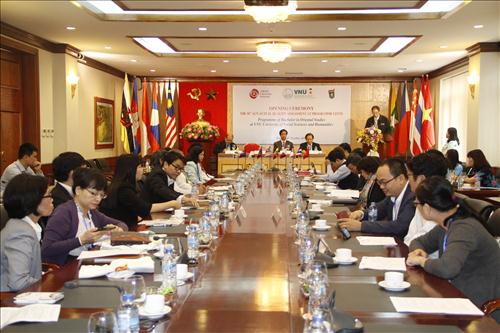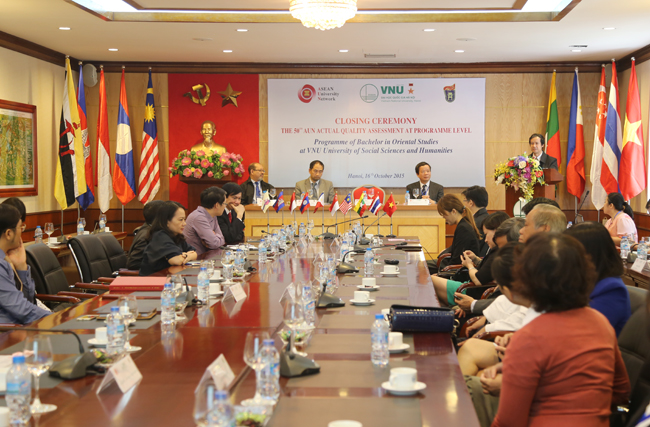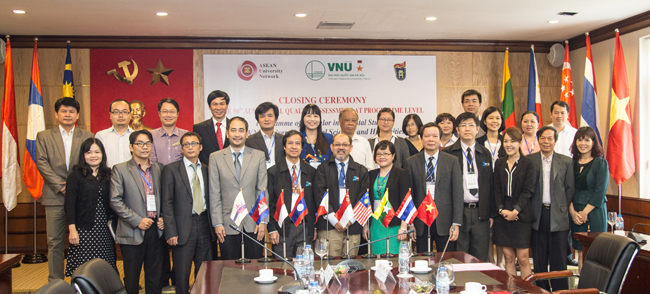
Attending the closing session were Choltis Dhirathiti, Deputy Executive Director of the ASEAN University Network (AUN), Ing-orn Jeerararuensak, representative of the AUN Secretariat, and the Accreditors Wan Ahmad Kamil Mahmood (team leader) and colleague Nakorn Srisukhumbowornchai.
Representing Vietnam National University, Hanoi (VNU) were Vice Director Nguyen Kim Son, leaders of functional departments, schools, faculties, and affiliated units of VNU, along with the Board of Directors, staff, lecturers, and representatives of the leadership of the Faculty of Oriental Studies of the University of Social Sciences and Humanities.
At the closing session, representatives of the External Evaluation Team addressed the strengths, potential, and areas for improvement according to the AUN-QA standards of the Bachelor of Oriental Studies program.
Regarding the program, the evaluation team representative stated that, fundamentally, the program is designed to promote learning activities, learning methods, and cultivate lifelong learning habits in students; it strikes a balance between specialized content, general knowledge, and essential skills with a well-distributed curriculum; the faculty and staff are enthusiastic, highly competent, and proficient in foreign languages; faculty and staff are given opportunities to learn, hone their skills, improve their competence and expertise, and foster their creativity; the quality of student intake is ensured through a national university entrance examination; policies and conditions to support students are good; and the employment rate of graduates is high.

To further improve the quality of the training program, AUN's evaluation experts suggested: greater emphasis on supporting and advising new students, helping them adapt to and overcome difficulties in the new learning environment; organizing more group activities to give students opportunities to use and improve their soft skills; improving students' English communication skills through exchange activities and club activities; attracting funding to support faculty and staff in scientific research; greater emphasis on establishing cooperative relationships with international partners; investing more in equipment for learning and research; and strengthening the role of alumni in serving the development of the Faculty and the University.
Speaking at the closing session, Mr. Choltis Dhirathiti – Deputy Executive Director of AUN – expressed his belief that the evaluation would bring great benefits in improving the quality of education and research of the Faculty and the University.

Vice Rector of Vietnam National University, Hanoi, Nguyen Kim Son highly appreciated the enthusiastic, serious, and systematic work of the AUN external evaluation experts. He emphasized that the observations and assessments of the program's strengths and areas for improvement will motivate faculty and staff to continue improving teaching quality and further enhance the program's quality. He also expressed his belief that the AUN experts' assessments are not only useful for the program being evaluated but also serve as a benchmark for many other training programs in their quality improvement efforts.
Vice Rector of the University of Social Sciences and Humanities, Nguyen Van Kim, affirmed that they will leverage strengths and improve weaknesses to further enhance the quality of training programs, contributing to the development of the faculty and the university in line with the trend of integration.
|
The current AUN-QA standards comprise 15 standards with 68 criteria. Each criterion is assessed on a 7-level scale: 1 = Completely fails to meet the assessment criterion requirements, immediate corrective action is required; 2 = Fails to meet the assessment criterion requirements, corrective action is needed; 3 = Fails to meet the assessment criterion requirements, but only minor corrective action is needed; 4 = Meets the assessment criterion requirements; 5 = Meets the assessment criterion requirements well; 6 = Meets the assessment criterion requirements very well; 7 = Meets the assessment criterion requirements excellently. Choosing AUN accreditation aims to help universities understand the level their training programs have reached on the regional evaluation scale. Furthermore, it helps identify areas for improvement to ensure the programs meet the quality standards of similar programs in the ASEAN region. With a long history of formation and development in Southeast Asia (ASEAN), over the past 16 years, the ASEAN University Network for Quality Assurance (AUN-QA) has a team of external evaluators, education experts, and quality assurance auditors. AUN-QA currently has 15 senior quality assurance experts and 36 auditors at various levels, from 22 universities in 7 ASEAN countries. As of 2015, with the addition of 8 new members, AUN-QA has a total of 16 member universities participating in the network. The establishment of AUN-QA and AUN has contributed to raising the profile of higher education in Southeast Asian countries, moving towards integration in educational quality with advanced countries around the world. |
Newer news
Older news